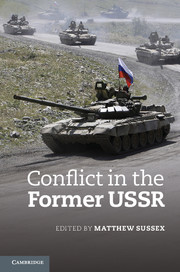Book contents
- Frontmatter
- Contents
- Maps
- Contributors
- Acknowledgements
- Abbreviations
- Map
- 1 Introduction
- 2 The return of imperial Russia
- 3 The shape of the security order in the former USSR
- 4 Great powers and small wars in the Caucasus
- 5 The Russo-Georgian war
- 6 Why not more conflict in the former USSR?
- 7 Transnational crime, corruption and conflict in Russia and the former USSR
- 8 The transformation of war?
- 9 Conclusions
- Bibliography
- Index
- References
5 - The Russo-Georgian war
Identity, intervention and norm adaptation
Published online by Cambridge University Press: 05 November 2012
- Frontmatter
- Contents
- Maps
- Contributors
- Acknowledgements
- Abbreviations
- Map
- 1 Introduction
- 2 The return of imperial Russia
- 3 The shape of the security order in the former USSR
- 4 Great powers and small wars in the Caucasus
- 5 The Russo-Georgian war
- 6 Why not more conflict in the former USSR?
- 7 Transnational crime, corruption and conflict in Russia and the former USSR
- 8 The transformation of war?
- 9 Conclusions
- Bibliography
- Index
- References
Summary
The war between Russia and Georgia in August 2008 had many hallmarks of a typical limited interstate war. It was fought between two independent sovereign states over a territorial dispute that had long been a sticking point. Before the creation of the USSR, Ossetia – and Abkhazia in particular – had been contested, and both Georgia and Russia had a mutual history of enmity over territory. There has been significant debate over who was responsible for the war, and also significant debate about how the West responded (or should have responded). But whilst the broad parameters of the conflict have already been documented in this volume, the war did reveal some interesting developments concerning how states go about pursuing their strategic goals in the former Soviet space. In particular, it revealed much about how war in the contemporary international system might be legitimated.
We argue that three developments are especially instructive. The first was that both Russia and Georgia claimed historical dominion over the Abkhaz and Ossetian spaces by pointing to notions of diaspora and kinship (in the case of Russia), and territorial right to govern (in the case of Georgia). This is not new in itself, but it serves as a useful reminder that the manipulation of identity is common in the development of rationales for war. The second development was the invocation by Russia and Georgia of two different interpretations of sovereignty, which produced diametrically opposing rationales for intervention. Third, Russia turned to a relatively surprising source – human security – to legitimate its claims.
- Type
- Chapter
- Information
- Conflict in the Former USSR , pp. 91 - 117Publisher: Cambridge University PressPrint publication year: 2012

